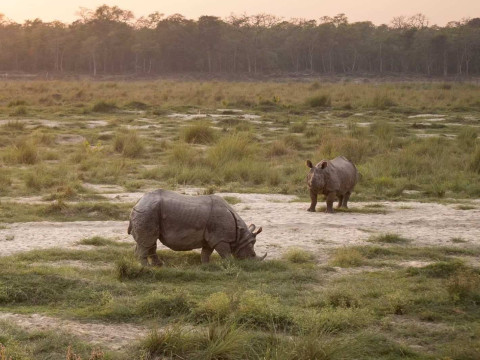Overview
Human-tiger conflict (HTC) has become a big challenge for tiger conservation in Nepal. The Banke-Bardia complex is a global tiger conservation priority site with 150 tigers currently, and it has potential to support >175 tigers in the 2,500 km2 habitat that also includes the forests adjoining the core habitats. These adjoining forests have high human population (>300,000 people) interacting directly with these forests for livelihood. Poverty and forest-dependency among these people aggravated during COVID-19 pandemic and intensified HTC. In this period, sudden hike in human deaths from tiger encounters were reported (20 deaths, 16 injuries), livestock depredation were in record high and three tigers were killed in retaliation. In response to this troublesome situation for tiger conservation, this project is implemented to reduce HTC and increase human-tiger coexistence in the complex.
Project objectives
- Set up well-equipped and dedicated team for problem tiger monitoring and rescue
- Develop showcase model for the protection of livestock from tiger attack
- Organize behavior change tiger conservation campaign
- Restore degraded forest patches in the buffer zones and forest corridors
- Initiate alternative livelihood options for the tiger victims
- Strengthen cooperation between India and Nepal on tiger conservation
Expected outputs
- A well-equipped and dedicated Rapid Response Team operational in the complex
- 400 large carnivore affected farmers supported with predator-proof corrals
- 7 km predator/game proof fence constructed in high conflict communities
- 40 tiger victim households engage in homestay tourism
- 30 village youths from victim families and HTC prone areas trained as nature guides
- 25 victim families engage in non-palatable cash crop farming for alternative to livestock rearing
- 35 trained youths reach ~19,000 people with behavioral change campaigns
- 30 CFUGs reached with education on grazing and forest fire control
- 20 CFUGs reached with education on tiger-positive forest management
- Invasive species removal in 100 ha degraded grassland and 60,000 seedlings planted in degraded habitats
- 6 trans-border meetings with India
Project partners
Department of National Parks and Wildlife Conservation, Buffer Zone Management Committees and Community Based Anti-Poaching Units
Project duration
January 2022 to December 2024
Budget
$ 734,640 ($400,000 USFWS, $183,340 NTNC, $39,800 DNPWC)
Principal Investigator (PI): Dr. Naresh Subedi, Conservation Program Director, NTNC
(nareshsubedi@gmail.com, 9855056934
Co-PI: Ajit Tumbahangphe, Conservation Officer, Bardia Conservation Program, NTNC (atumbahangpfe@ntnc.org.np, 9858025107)
The project is funded by the Rhinoceros and Tiger Conservation Fund of the United States Fish and Wildlife Service (USFWS).









